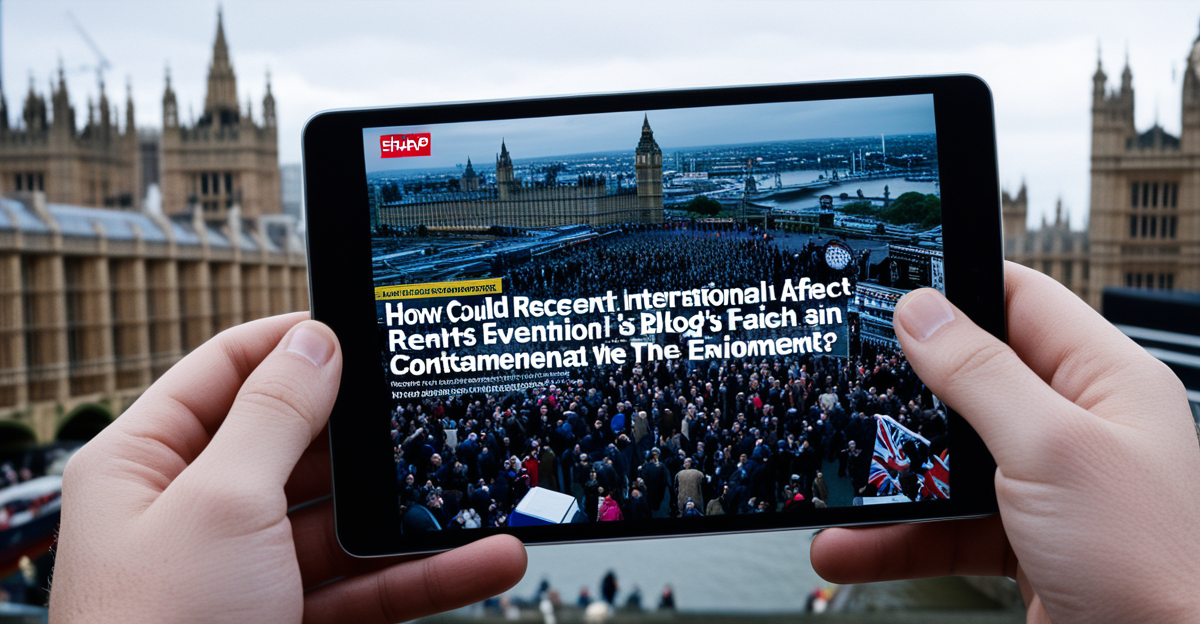Immediate Impact of Recent Events on the UK’s Global Standing
Recent UK events have significantly influenced the country’s international relations and the global perception of its diplomatic standing. Notably, shifts in UK foreign policy have prompted varied immediate reactions from key partners and international organisations. Allies in Europe and beyond are closely observing these changes, which affect ongoing collaborations and strategic alignments.
Initial responses reveal a cautious approach from prominent players, reflecting concerns about the UK’s stability and commitment. This has led to increased scrutiny of the UK’s diplomatic credibility, with some partners questioning its reliability amid evolving policies. The UK’s ability to maintain trust is crucial as it navigates a complex post-Brexit world where its global role is continuously reassessed.
In the same genre : How Does the UK Media Shape Public Opinion?
Moreover, these recent UK events have underscored the challenges in sustaining constructive dialogue, impacting not only bilateral relations but also the country’s influence in multilateral forums. The overall global perception is nuanced; while some regard the UK as striving to redefine its identity, others see uncertainty affecting its traditional diplomatic weight. Strengthening communication and reaffirming commitments will be essential for restoring confidence in the UK’s international role.
Economic Consequences for Trade and Investment Relations
Recent UK events have decisively altered the landscape of UK global trade and international investment, introducing both challenges and prospects. The adjustments in Brexit impacts are evident through the reconfiguration of trade agreements. For example, renegotiations and new deals seek to fill gaps left by EU departure, but uncertainties persist among business communities. Many investors monitor these shifts closely, affecting business confidence and willingness to commit capital within the UK market.
Additional reading : The impact of political changes on UK’s environmental policies
Fluctuations in foreign investment trace directly to perceptions of the UK’s regulatory environment, trade access, and economic stability. Countries and corporations reassess risks, sometimes delaying or redirecting investments. On the other hand, emerging opportunities arise from the UK’s ability to forge bilateral agreements beyond Europe, diversifying economic partnerships. Strategic sectors such as technology and finance are focal points for such international interest.
Importantly, the evolving economic partnerships reflect a balancing act—leveraging historic ties like the Commonwealth while expanding ties in Asia-Pacific regions. This multifaceted approach is essential in mitigating growth risks caused by Brexit impacts and recent UK events, influencing the UK global trade standing and shaping its future economic trajectory.
Evolving Security and Defence Alliances
Recent UK events have prompted significant shifts in the UK security policy and its approach to international defence alliances. Notably, the UK has reaffirmed its commitment to NATO, intensifying defence collaboration to address increasing global security threats. Changes include enhanced military exercises and intelligence sharing, reflecting heightened concerns over regional instabilities and hybrid warfare tactics.
The UK’s role within NATO remains central; it acts as a strategic partner facilitating coordination among member states to counter evolving threats, such as cyberattacks and geopolitical challenges. Beyond NATO, the UK is expanding bilateral security partnerships, seeking to bolster defence collaboration with allies in Asia-Pacific and the Commonwealth. These adjustments serve to diversify the UK’s security engagements, adapting to a more complex global threat landscape.
In response to these emerging challenges, UK security policy is also focusing on technological advancements, including cyber defence and unmanned systems, which are crucial for modern military readiness. These developments underscore a proactive stance aimed at preserving national security while reinforcing the UK’s influence within international defence frameworks. This evolving strategy strengthens both the UK’s defence posture and its credibility as a reliable security partner.
Shifting Political and Diplomatic Strategies
Recent UK events have catalysed a recalibration of UK diplomatic strategy, reflecting evolving priorities in international diplomacy. In response, the UK is redefining its engagement with major powers, aiming to reinforce bilateral relations while adapting to shifting geopolitical realities. This includes nuanced approaches toward the US and the EU, balancing historic ties with current strategic interests.
Within the United Nations and other multilateral forums, the UK’s role is undergoing subtle transformation. While committing to traditional leadership positions, it is seeking to amplify influence through coalitions aligned on climate, security, and economic governance. This repositioning aims to offset perceived limitations emerging from recent policy shifts.
Bilateral relations with Commonwealth nations also feature prominently in this evolving diplomatic landscape. Emphasising shared history and mutual interests, the UK is revitalising these partnerships to strengthen political and trade ties beyond Europe.
Ultimately, these developments indicate a comprehensive effort to sustain the UK’s global diplomatic footprint despite challenges posed by recent events. Strategic flexibility and proactive engagement remain central themes of the current UK diplomatic strategy, critical for maintaining relevance in a complex international system.
Expert Perspectives and Future Scenarios
In assessing recent UK events, expert analysis highlights complex challenges and opportunities shaping the UK’s global relations. Scholars underline that evolving geopolitical dynamics demand adaptive responses in UK foreign policy to sustain influence. Forecasts based on current trends suggest several plausible trajectories for the UK’s international standing.
Policy analysts emphasize the critical role of maintaining robust economic partnerships and security alliances as pillars of future strength. This includes leveraging post-Brexit trade realignments and deepening engagement in emerging markets. Experts agree that success depends on proactive diplomacy and clear strategic priorities.
Regarding future scenarios, some foresee enhanced cooperation with Commonwealth countries and Asia-Pacific nations bolstering the UK’s global reach. Conversely, risks involve potential isolation if diplomatic ties with key partners weaken, highlighting the importance of multilateralism in the UK diplomatic strategy.
Additionally, commentary stresses the need to invest in technological innovation within security policy to counter evolving global threats. Integrating expert insights offers a comprehensive view on how the UK can navigate uncertainties, positioning itself effectively amid international complexities and advancing its global policy outlook.




